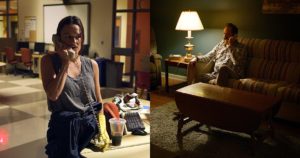LAST CALL uses what at first seems like a gimmick, two people on a split screen filmed at separate locations in one take in real time, to tell a quietly wrenching precis on loneliness and the need to connect in the 21st-century where access is immediate via phone or internet, but real connection is rare. The gimmick, though, is a devastatingly effective method of reinforcing the film’s theme of isolation as experienced by its two characters, Beth, a single-mother working two jobs and going to school in order to make a better life for her two sons who never see her as a consequence, and Scott, who is drinking is way alone through a heart-breaking anniversary after being shut-out by his daughter. The visual cues as the split screen shifts from horizontal to vertical emphasizes both the distance and the immediacy of the two characters, underscoring each aspect of this new relationship that has anonymity as the gateway into an intimacy that an in-person conversaion would preclude.
It begins with Scott, at the top of the horizontally split screen, closing down a decidedly non-hipster bar. Beth is munching French-fries and sipping from an enormous soda. We’re not sure where the music is coming from, nor, in a clever bit of cinematic legerdemain, just who Beth is trying to track down on her cell phone. Is it this bear-like man whose affect shows a disconnect from his surroundings? While he is stumbling zombie-like from the bar to his impersonal apartment, she is vibrant, if only because of her increasing frustration over not being able find what turns out to be her older son, who is late returning home. Dialogue on each track fades in and out as Scott buys a bottle from the bartender, and Beth becomes more agitated. As the film plays out, the juxtaposition of each character in relation to the other takes on pointed correspondences.

Sarah Booth, Daved Wilkins
Beth is coping with a last-minute late shift as a cleaner at the college she attends while trying to track down her son. When her phone dies, she gives out an office number to her babysitter, but the call that comes is from Scott, who has incorrectly written down the number of suicide-prevention hot line. At first, and in an arch metaphor, they speak at cross purposes and the sound on both tracks remains robust. He is surprised that the office is closed. She is surprised, and a little vexed, that he doesn’t want to leave a message for when the regular staff comes in. But she is polite, perhaps from concern, even curiosity, over a stranger so obviously needing to talk, or from needing for herself a distraction from her own problems. Eventually they sort it out.
Beth, wearing a headset as she goes about her cleaning duties. Whatever the first impulse, Beth continues to draw Scott out, and he, in turn, asks about her day, and gradually about her life. The conversation has the novelty of emotional honesty, and Beth, despite the worry of a son unaccounted for, becomes invested in the voice on the phone. As she probes the source of his anguish, and he answers with brutal honesty about himself, the human connection builds, and she attempts to temper his despair, clumsily, but with genuine caring. At the same time, his affect drops as do his defenses, the pain inside revealing itself bit by bit.
The performances are as riveting as they are subtle. Sarah Booth using her physicality to annotate her character’s words. Beth’s wiping down tables becomes a surrogate action for what Beth would like to do to the husband that deserted her, and co-writer Daved Wilkins, with his monotone and almost robotic movements, the personification of Elizabeth Barrett Browning’s poetic observation that hopeless grief is passionless. He gives this shambling man just enough of a spark inside to imbue this unintended conversation with a desperation and unreconstructed self-loathing that transcends drama. The two of them make that all but instant connection between these two characters not just believable, but compelling, particularly as Scott spirals downward, changing the subject from his bottomless to despair to the history of cocktails as Beth tries to convince him that life, even a tough one, is worth the struggle. The wrong number becomes not just a random thing, but something with the weight of destiny about it, as each finds the other at a critical time that will change everything.
LAST CALL builds to a climax that might be considered inevitable, but is nonetheless ruthlessly intense in the suspense it engenders in the audience as these two characters discover the intimacy of instant communication by phone has its inevitable limitations. With its palpable respect and compassion for its characters,ordinary people who are neither saints nor sinners, it demands the same from its audience, and makes the case for why it is right to do so.
Your Thoughts?